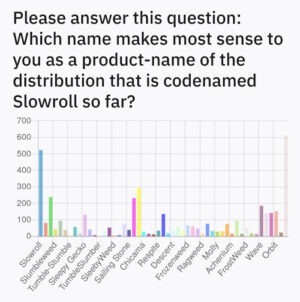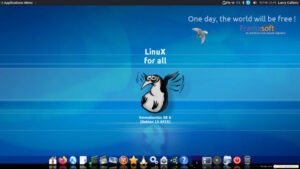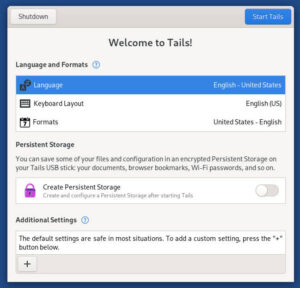Also included in this week’s FOSS Week in Review: Gnome’s new due date, readers say Red Hat’s changed for the worse under IBM, and a new poll asks how you like your distros released.

Well, I’ve finally moved into the new house which I’m calling FOSS Force World Headquarters. I’ll have more on that in an article next week, but right now, let’s get to this week’s news roundup.
RMS Says He Has Lymphoma
When GNU and Free Software Foundation founder Richard Stallman showed up at the GNU Hacker’s Meeting in Biel, Switzerland on Wednesday as part of GNU’s ongoing celebration of its 40th birthday, he was noticeably without his trademark long hair and beard. We learned about two minutes into a talk he gave at the event, that’s because he’s currently battling cancer.
He was also wearing a mask, and opened his talk (after a bit of a mic problem) by admonishing those in the room to also wear masks to keep from getting Covid:
“Because there’s a certain chance you’ll get long Covid where you could have brain fog for the rest of your life. That was my original reason for protecting myself carefully from Covid. I don’t want those things to happen to me because I want to be capable of doing things that contribute, and long Covid could make that impossible. It could do it to you too, and that would be a shame.
“But I have a worst problem now. I have cancer; it’s a kind of lymphoma. Fortunately, it can be managed. I’ll be around be around for many more years, so it hasn’t made a fundamental change in my life. I’m still working for free software and other causes I support separately, and I’m still involved in carrying the Gnu Project forward. So, that’s why I don’t have much hair anymore, but other than that I basically look the same when you get to see me with the mask off, which I do when I’m outside.”
RMS spent his time at the podium mainly talking about his take on issues concerning AI, which FOSS Force will be covering in the next day or two.
Stallman later offered a few more details on his personal website:
“Richard Stallman has cancer. Fortunately it is slow-growing and manageable follicular lymphona, so he will probably live many more years nonetheless. But he now has to be even more careful not to catch Covid-19.”
Here’s wishing RMS a speedy and complete recovery!
Linux LTS Isn’t What It Used to Be
Jonathan Corbet, a Linux kernel developer who’s also co-founder and editor at LWN, last week let it be known at Open Source Summit Europe in Bilbao, Spain that the definition of “long term” (as in “long term support”) has now changed when it comes to the Linux kernel. For something like forever, Linux LTS kernels have been supported for six years, but that’s now dropping down to two years.
Why? you ask. Well, for one thing, with six years of support, that means there’s a lot of kernels out there that need to be supported — six at present, as a matter-of-fact — which is a huge drain on the Linux dev team, especially when you ask, “Who’s actually using a six-year-old kernel anyways?”
As Corbet put it: “There’s really no point to maintaining it for that long because people are not using them.”
The good news is that this frees a bunch of Linux devs up to do other things besides keeping code that nobody’s using anymore supported.
‘Privacy Sandbox’ Doesn’t Mean What Google Wants You to Think It Means
Running Chrome? If so, you might think that it would be a good thing to have Privacy Sandbox running (especially if you give a rat’s behind about privacy issues), because the name tells you that this Chrome “feature” is an example of dear old grandfather Google making sure your privacy is protected.
You would be wrong, of course (because you’re always wrong when you think that Google is doing anything for the good of you). Actually, this is Google wanting to be the fox that guards the henhouse.
The folks at Electronic Frontier Foundation explain:
“With the version of the Chrome browser released in September 2023, Google tracks your web browsing history and generates a list of advertising “topics” based on the web sites you visit. This works as you might expect. At launch there are almost 500 advertising categories—like “Student Loans & College Financing,” “Parenting,” or “Undergarments”—that you get dumped into based on whatever you’re reading about online. A site that supports Privacy Sandbox will ask Chrome what sorts of things you’re supposedly into, and then display an ad accordingly.
“The idea is that instead of the dozens of third-party cookies placed on websites by different advertisers and tracking companies, Google itself will track your interests in the browser itself, controlling even more of the advertising ecosystem than it already does. Google calls this “enhanced ad privacy,” perhaps leaning into the idea that starting in 2024 they plan to “phase out” the third-party cookies that many advertisers currently use to track people. But the company will still gobble up your browsing habits to serve you ads, preserving its bottom line in a world where competition on privacy is pushing it to phase out third-party cookies.
“Google plans to test Privacy Sandbox throughout 2024. Which means that for the next year or so, third-party cookies will continue to collect and share your data in Chrome.”
EFF points out that some other browsers, even mainstreamers like Firefox and Safari, have built-in privacy protections from third-party cookies, making them better options. For those who insist on sticking with Chrome, EFF suggests turning Privacy Sandbox’s privacy sucking features off. Although doing so isn’t quite intuitive, EFF tells you how in the article linked above.
OpenSUSE Is Keeping the Name ‘Slowroll’
A couple of weeks back, we told you about Slowroll, openSUSE’s new take on rolling releases that appears to be in line to eventually replace Leap, the distro’s main edition that’s always been released the old fashioned way, by following a fixed release schedule. This change has been necessitated by the fact that Leap’s upstream source, SUSE Linux Enterprise, which is also released the old fashioned way, is about to transition into something that SUSE is calling Adaptable Linux Platform, in which much of the operating system will be containerized.

The nice thing here is that the openSUSE devs didn’t arbitrarily decide how to deal with this issue, but went to their users to see what they wanted. When offered the choice of a new fixed release version that would be out-of-sync with SUSE’s enterprise offering, or a version (code named “Slowroll”) based-on Tumbleweed, openSUSE’s rolling release, users chose the later. The difference between the two? While Tumbleweed will be constantly updated like a traditional rolling release, Slowroll will add a degree of stability by slowing down the update process. Bug fixes and security patches will be applied as they are available, but feature upgrades will happen every month or so.
After that was decided, the openSUSE folks went back to their users and asked them what they should call this new take on their distro, and the users told them that Slowroll will be fine.
Already Ready for a New Gnome?
Less than a week after the folks at Gnome rolled their latest and greatest out the door, they’ve announced the due date for their next release, Gnome 46, which will arrive on March 20, a date that Gnome dev Michael Catanzaro says is “set in stone.”
To paraphrase Cass Elliot: There’s a new Gnome coming. It’s just around the bend.
Speaking of stone, Gnome 46 will be called “Kathmandu,” after the host city of the GNOME.Asia 2023 event, which will happen December 1-3, and which proves that Janis Joplin was right when she said the road doesn’t even end in Kathmandu.
It’s way to soon to be talking about what will be in Gnome’s next, but on Tuesday, Marius Nestor at 9to5Linux came up with something of a wish list of stuff he’d like to see.
Red Hat Poll Results (and a New Poll)
Has Red Hat changed for the better or for the worse as an open-source company under IBM's ownership?
Total Voters: 19 |
On September 8, which was about three weeks ago, we posted a poll here in FOSS Week in Review asking, “Has Red Hat changed for the better or for the worse as an open-source company under IBM’s ownership?” At the time, we promised you that we would offer the results the following week, and that we would post a new poll each and every week in this column going forward. So far we’ve done neither, mainly because in the midst of finding a new place to call home (more of that early next week), we totally forgot. Today we’ll rectify both of those things.
First, the old poll: Only 19 of you voted, so it was hardly a definitive sort of sample, but according to those 19, Red Hat has definitely changed for the worse under IBM’s ownership. Seventeen of you, or close to 90%, voted that way, with 11 saying the change has been “very much for the worse” and six saying only “slightly for the worse.” The other two voters were neutral, saying any change has been “neither for the better or worse,” and absolutely no one saying that Red Hat has changed for the better by any degree.
Now, the new poll: All of the brouhaha at openSUSE about not being able to put out a reliable timed release clone of SLE has me wondering how you like your distro to be released. Do you prefer a distro that’s released on a fixed schedule, a rolling release that’s always up-to-date, or do you think a slowed down approach to a rolling release such as openSUSE is doing with Slowroll would work better for you? Does it even matter? Or does it depend on whether the distro will be used to run a server or a desktop?
Do you prefer distros that are released on a fixed schedule, as a rolling release, as a slowed-down rolling release like Slowroll, or something else?
- Traditional fixed-schedule releases for me. (38%, 33 Votes)
- It depends on whether I'm using it as a server or as a desktop (30%, 26 Votes)
- I like always up-to-date rolling releases. (16%, 14 Votes)
- I like the slower approach to the rolling release, like openSUSE is doing with Slowroll. (14%, 12 Votes)
- It doesn't matter (3%, 3 Votes)
Total Voters: 88
Vote, and we’ll discuss it here next week…if I don’t forget.
In the meantime, may the FOSS be with you…
Christine Hall has been a journalist since 1971. In 2001, she began writing a weekly consumer computer column and started covering Linux and FOSS in 2002 after making the switch to GNU/Linux. Follow her on Twitter: @BrideOfLinux











